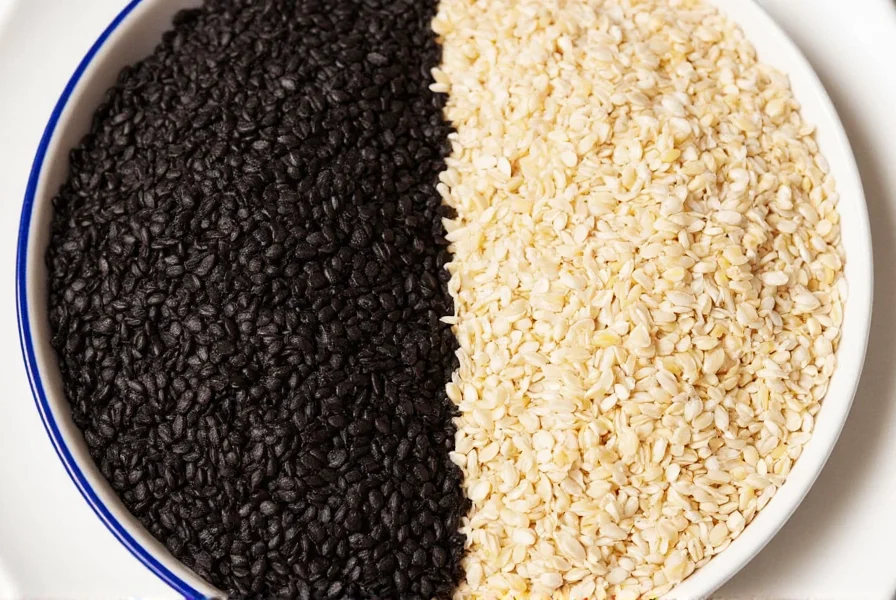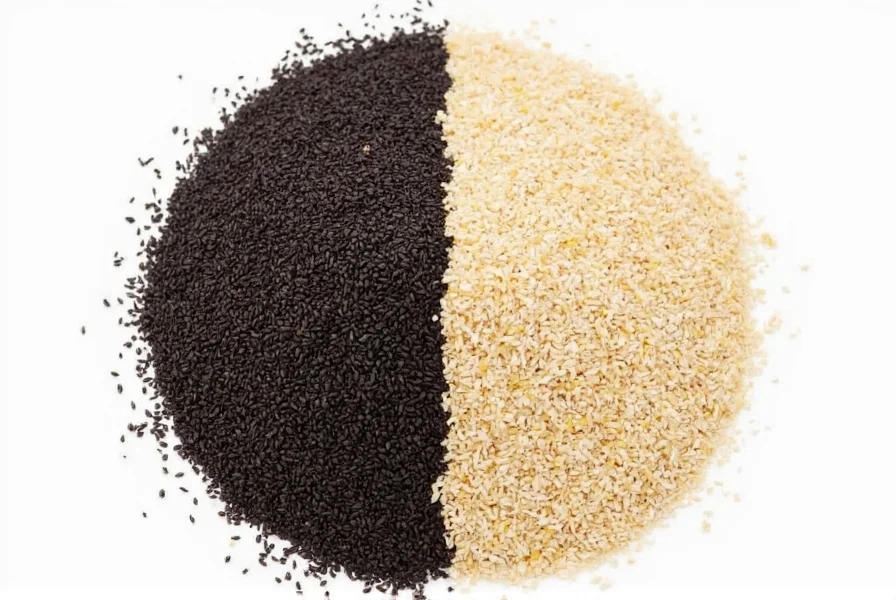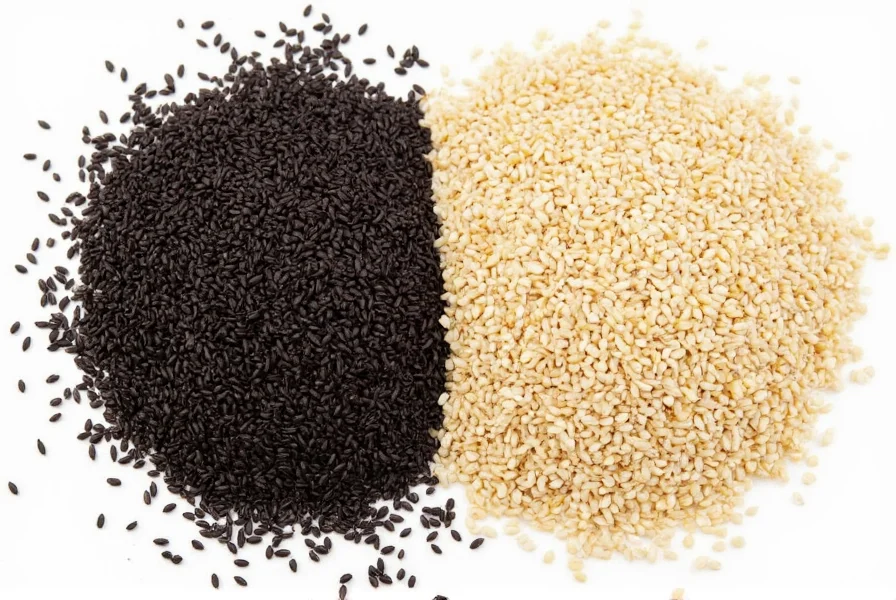Table of Contents
Introduction
Black sesame seeds and white sesame seeds differ significantly in flavor, texture, nutrition, and culinary applications. Black seeds are unhulled, delivering a stronger, earthy flavor and higher nutrient density, while white seeds are hulled for a milder, nuttier taste. This guide provides clear comparisons and actionable advice to help you select the right type for your recipes.
Key Differences Between Black and White Sesame Seeds
| Feature | Black Sesame Seeds | White Sesame Seeds |
|---|---|---|
| Hulling Status | Unhulled (outer shell intact) | Hulled (outer shell removed) |
| Flavor Profile | Strong, earthy, slightly bitter | Mild, nutty, buttery |
| Texture | Crunchier, denser | Softer, smoother |
| Nutritional Highlights | Higher calcium, fiber, antioxidants | Higher iron, magnesium |
| Culinary Best Uses | Asian desserts, savory dishes, sauces | Breads, salads, light dressings |
| Visual Impact | Dark color for dramatic contrast | Subtle golden hue |
Practical Tips for Using Both Types
- Toast for maximum flavor: Toast black seeds 4-5 minutes at 300°F (150°C) for intense aroma; toast white seeds 3-4 minutes to avoid burning due to lower oil content.
- Black for bold dishes: Use in miso soup, black sesame ice cream, or as a coating for grilled fish. Their strong flavor stands up to robust ingredients.
- White for delicate applications: Sprinkle on avocado toast, mix into yogurt parfaits, or use in gluten-free bread recipes where subtle flavor is key.
- Make authentic paste: Black sesame paste requires 20% more seeds than white for the same volume due to higher density. Ideal for traditional Japanese kurogoma sweets.
- Storage science: Freeze both types in airtight containers for 12+ months. Room temperature storage should not exceed 3 months due to high oil content.

How to Choose the Right Sesame Seeds
Key Buying Criteria
- Whole vs. Hulled: Black seeds should always be sold whole; white seeds must be clearly labeled as hulled. Unhulled white seeds indicate poor processing.
- Origin matters: Japanese black sesame (Kurogoma) has superior flavor profile. Indian white sesame is ideal for Indian cuisine applications.
- Quality indicators: Look for uniform size, no discoloration, and a fresh nutty smell. Avoid seeds with visible moisture or clumping.
Specialized Applications Guide
- Traditional Asian cooking: Choose whole, unroasted black sesame seeds from Japan or China. These retain the highest nutrient density for authentic recipes.
- Baking and desserts: Opt for lightly roasted white sesame seeds with a golden hue. Avoid dark roasted seeds that overpower delicate flavors.
- Nutrition-focused recipes: Select organic black sesame seeds with certified high calcium content. The unhulled variety provides 3x more calcium than white.

Frequently Asked Questions
What's the main difference between black and white sesame seeds?
The core difference is hulling status: black seeds are unhulled (retaining their outer shell), while white seeds are hulled. This results in black seeds having stronger flavor, higher calcium and fiber content, and darker color. White seeds have a milder taste, smoother texture, and slightly higher iron content. The hulling process also affects nutritional availability and culinary applications.
Can I substitute black sesame seeds for white (or vice versa) in recipes?
Substitution is possible but requires adjustments. Black seeds will dominate delicate dishes with their strong flavor - use 30% less when substituting for white seeds. White seeds can replace black in most applications but won't provide the same visual impact or earthy depth. For baking, white seeds work better in sweet applications while black seeds excel in savory dishes like sesame crackers or miso-based sauces.
Which sesame seeds are healthier?
Black sesame seeds are nutritionally superior due to their unhulled state. They contain 3x more calcium, 50% more fiber, and higher levels of antioxidants like sesamin and sesamolin. White seeds still provide valuable nutrients including iron and magnesium, but the hull removal eliminates many micronutrients. For maximum health benefits, choose organic black sesame seeds.
Why are black sesame seeds more expensive than white ones?
Black sesame seeds command higher prices due to: 1) Lower global production volume (only 20% of sesame harvest is black), 2) Higher demand in premium Asian cuisine markets, 3) The hulling process required for white seeds increases processing costs, and 4) Black seeds' superior nutritional profile makes them a specialty ingredient. Premium Japanese Kurogoma varieties can cost 2-3x more than standard white sesame seeds.
How should I store sesame seeds to keep them fresh?
Store both types in airtight glass containers in the freezer for maximum shelf life (12-18 months). Room temperature storage should be limited to 3 months due to high oil content. Always check for rancidity by smelling - fresh seeds have a pleasant nutty aroma, while spoiled seeds smell like old oil. Toasted seeds should be used within 2 weeks for best flavor.
Can I use both black and white sesame seeds together in recipes?
Yes, combining both creates beautiful visual contrast and balanced flavor profiles. Use a 1:1 ratio for toppings on sushi rolls, rice bowls, or artisan breads. The black seeds provide earthy depth while white seeds add mild nuttiness. This combination works particularly well in sesame-crusted salmon or as a garnish for black sesame soup. Avoid using both in delicate desserts where flavors might clash.
Conclusion
Black and white sesame seeds are distinct ingredients with unique culinary applications. Black sesame's robust flavor and nutritional density make it ideal for traditional Asian dishes and health-focused recipes, while white sesame's mild profile excels in Western baking and light applications. By understanding these differences and following proper storage techniques, you can maximize both flavor and nutrition in your cooking. Remember: the right choice depends entirely on your recipe's requirements - there's no "better" option, only the right option for your specific dish.











 浙公网安备
33010002000092号
浙公网安备
33010002000092号 浙B2-20120091-4
浙B2-20120091-4